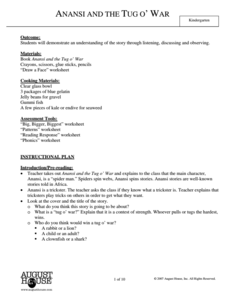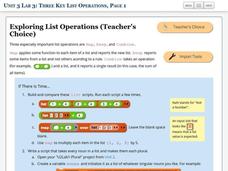Core Knowledge Foundation
Third Grade Skills Unit 2: Rattenborough’s Guide to Animals
An animal-themed unit focuses on third-grade skills. Scholars practice spelling patterns, prefixes, suffixes, and grammar concepts—nouns, verbs, adjectives, subjects, predicates, and sentences. Assessments gauge proficiency.
Core Knowledge Foundation
Third Grade Skills Unit 5: Adventures in Light and Sound
Light and sound are the themes of a unit focused on third-grade skills. Scholars practice spelling patterns, grammar—adverbs, adjectives, synonyms, writing sentences with conjunctions, and listening and responding to read-aloud. Over...
Core Knowledge Foundation
Third Grade Skills Unit 8: Native American Storiess
An interdisciplinary unit focuses on third-grade ELA skills and Native American stories. Over two weeks, scholars practice spelling patterns, work with plural possessive nouns and suffixes, and identify between its and it's. Readings...
Core Knowledge Foundation
Third Grade Skills Unit 3: How Does Your Body Work?
A skills unit combines ELA and science with lessons that explore the human body. Lessons begin with a reading, go into skills practice, and offer take-home materials. Skills practice includes listening to and discussing a read-aloud,...
American Chemical Society
Using Color to See How Liquids Combine
Blue-tinted water is added to unknown liquids that have been tinted yellow to find out how they interact. This is a memorable activity that is part of an investigation on the properties of liquids, which is part of a unit on the...
Core Knowledge Foundation
Third Grade Skills Unit 4: Stories of Ancient Rome
A unit covering stories of Ancient Rome examines spelling rules, suffixes, verbs, quotation marks, writing, and dictionary skills. Lessons follow a similar routine; reading, skills practice, and extension activities, followed by...
Core Knowledge Foundation
Third Grade Skills Unit 6: Gods, Giants, and Dwarves
The halfway mark of a series offers final skills practice in spelling patterns, suffixes, and building sentences with conjunctions in preparation for assessments that gauge proficiency. Remediation and enrichment follow the test results...
Scholastic
STEM Challenges and Activity Sheets for Grades 6–8
From 3-D cities to building bridges, young engineers engage in innovative STEM challenges that promote brainstorming and collaboration. Learners take on the roles of different types of engineers as well as become familiar...
Friends of Fort McHenry
Cannons During the War of 1812
During the Battle of Baltimore in the War of 1812, only 25% of the bombs and rockets fired at Fort McHenry actually reached their target. Using an interactive online simulation, combine your historical study with physics and...
Columbus City Schools
Speed Racers
Who wants to go fast? The answer? Your sixth-grade science superstars! The complete resource offers the ultimate, all-inclusive playbook for mastering the important concepts of speed versus time; distance versus time; and how...
EngageNY
Continued Close Reading of Bullfrog at Magnolia Circle: Text-Dependent Questions and Vivid Words and Phrases
In the third activity from this unit based on the book Bullfrog at Magnolia Circle, learners focus on using specific details from the text-to-answer questions about the habitat of bullfrogs. While reading the text, young...
August House
Anansi and the Tug o' War
Combine art, math, language arts, drama, and delicious Jell-o with a instructional activity based on the African folktale Anansi and the Tug o' War. Kids make predictions and discuss plot points of the story before joining in...
American Chemical Society
Evaporation
This is one in several lessons that explore the relationship between temperature and phase changes of water. After some discussion, elementary physical scientists place wet paper toweling on a hot and a room-temperature water bag...
Dick Blick Art Materials
Start with a Circle...
The Golden Ratio. The Divine Proportion. Yup. It's math and art blended into one colorful activity. Young artists combine colored tissue paper circles and parts of circles to create geometric patterns. As a bonus, kids get to figure out...
Dick Blick Art Materials
Painted Story Quilt
Creating story quilts is a great way to combine art, social studies and literature. Kids select a story, a published one or one of their own, to illustrate, paint on a canvas square, embellish, and mount on a felt backing.
Dick Blick Art Materials
Simple Suminagashi
Go ahead. Spill the ink! Combine the study of art, social studies, and science with a Suminagashi (spilled ink) activity that produces "unique and unreproducible" works of art.
Science Matters
Solar Energy
The solar energy industry in the United States added more jobs in 2015 than the oil and gas extraction and pipeline industries combined. With the field growing so rapidly, it's essential to understand what solar energy is and how it...
National Gallery of Canada
Lumps, Bumps, Gritty, and Soft!
Texture can really add to a work of art. Explore texture through observation and practice. Learners view and discuss works of art by M.C. Escher. They then create their own texture samplers with six different materials.
Teach Engineering
Red Cabbage Chemistry
Using the natural pH indicator of red cabbage juice, groups determine the pH of different everyday liquids. As they work, pupils gain an understanding of pH that may help deal with contaminants in the water supply.
American Chemical Society
Different Substances React Differently
Looks don't tell the whole story. Young experimenters explore reactions with substances that look similar. They observe the reactions that take place when combined with baking soda and use indicators to conclude they react differently...
American Chemical Society
Exploring Baking Powder
Birthday cake wouldn't be light and fluffy without the chemical reactions between ingredients. Young scientists explore some chemical reactions in the 11th installment of a 16 lesson Inquiry in Action series. They determine the...
American Chemical Society
What’s the Difference between Baking Soda and Baking Powder?
Introduce pupils to chemical reactions. Using the hands-on lesson, learners experiment with substances that combine to form a gas. Different substances react to form different amounts of gas, leading to a discussion about the particles...
American Chemical Society
Using the Properties of Materials to Improve a Model Boat
Work together to stay afloat. Using a paper boat, pupils connect properties of materials to their usefulness. They test different paper to determine how many pennies each boat will hold and learn that combining materials with different...
Beauty and Joy of Computing
Three Key List Operations
Develop an understanding of the Map, Keep, and Combine operations. The lab leads the class through the exploration of three list operations. Each task contains a self-check to measure scholars' understanding of the operation in the...























